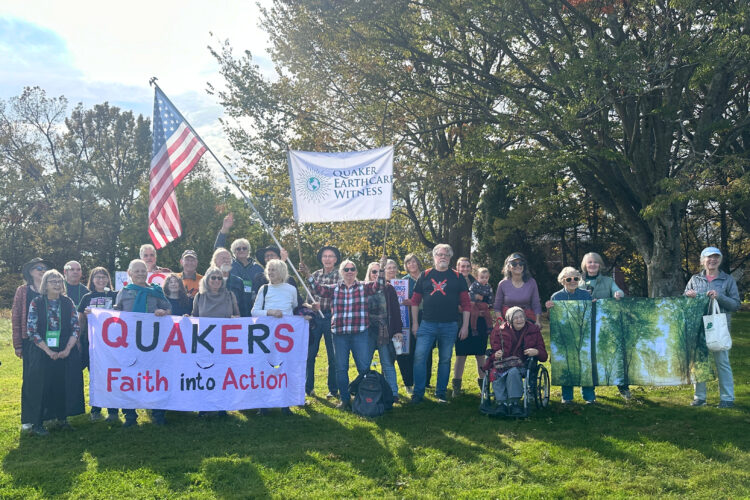Let the Youth Be Heard: Making the Courts Confront the Climate Crisis
By Shelley Tanenbaum.
YOUNG PEOPLE, who are facing a disturbing future due to increasing climate catastrophes, can often feel like their voices are not heard. Lacking power, influence, and even the right to vote, some youth have turned to the courts. In 2015, 21 youth plaintiffs plus Dr. James Hansen sued the federal government, charging that the government, through its actions, both violated their constitutional rights to life, liberty, and property and failed to protect the public trust. Due to their age, the youth assert that they are particularly at risk from the increasing ravages of climate disruption.
The case has slowly been moving through the legal system. The case was initiated by Our Children’s Trust, a foundation based in Oregon. They passed a major hurdle when a Federal District Court judge in Oregon denied a motion to dismiss the case and a trial was set for February 5, 2018. However, in mid-2017, the Federal government requested a writ of mandamus, asking for the case to be dismissed because it is “improper” and “seeks wholesale changes in federal government policy based on utterly unprecedented legal theories.” Granting a writ of mandamus is highly unusual and requesting the writ delayed the scheduled February 2018 trial.
A hearing was held on the question of granting the writ of mandamus at the Ninth Circuit Court in San Francisco on December 11, 2017. About 50 of us observers were ushered into the ornate courtroom along with 18 of the youth plaintiffs and their families, Dr. Hansen, and the media. One of those plaintiffs is Nathan Baring, a young Friend from Fairbanks, Alaska. Nathan is a seasoned environmental activist, despite turning 18 recently. Several hundred supporters greeted the youths and their families on the courthouse steps.
I talked to Nathan a few weeks after the hearing to learn more about why he agreed to be part of this historic case. Nathan has been active on issues such as air quality since he was twelve. Especially in the winter, wood smoke in Fairbanks often leads to extremely unhealthy air quality, at times achieving worst in the world status. Nathan had attended and led rallies and lobbied legislators, but he was frustrated with a lack of results and the feeling that as a non-voting constituent, he didn’t have much of a voice.
Nathan joined the case when he was 15 “almost as a last resort.” He felt this was “a way for youth to have a say on a global problem—climate change.” Nathan is also frustrated by how short-sighted many of our policies and actions can be. He hopes that this case will compel the federal government to seriously consider long-term interests.
I asked Nathan if he felt any differently now than he did nearly three years ago when he joined the case. He explained, “One of the reasons I joined the case in 2015 was that I was still unable to vote. I had utilized essentially every avenue open to an activist, but the science kept getting starker as our government became more entrenched in their destructive collusion with the oil industry. The judicial path remained an option of last resort that I deemed necessary. I now just recently registered to vote, but my drive to give youth a more powerful seat at the table remains the same. Climate change is pressing, but it has gotten bogged down in politics. We need to take concrete steps to address climate change, and I am hoping that a court decision could compel governments to rise above politics and confront this problem. I believe our government system of checks and balances plays well into this lawsuit because a win for us would force Congress to take tangible steps in confronting the climate crisis, and the court would provide the legal mandate to keep them on track.”
Before the San Francisco 9th Circuit hearing, Quaker Earthcare Witness signed on to an amicus brief, supporting the youth plaintiffs and the Our Children’s Trust case. We were one of 15 faith-based groups that contributed to the brief, citing “the moral foundations of government stewardship and action on climate.” In addition, seven other amicus briefs were filed. During our decision-making process, QEW Friends expressed great delight in being able to support Nathan and this case. Nathan commented, “I am extremely grateful to QEW because my actions are grounded in Quaker principles. It is uplifting to have a tangible Quaker organization having my back because it really cements my alignment with the Quaker community. I was supported by my family, my friends, my community, and now my faith.”
After delaying the trial for several months, the Federal 9th Circuit issued a decision on March 7 in favor of the youth. They will be heard! This landmark case has paved the way for future legal action. It has linked the Public Trust Doctrine with climate change. And, it has inspired similar legal action in other countries, including the Netherlands, India, and Pakistan. We will keep you up to date on the trial as it unfolds.
Nathan wants us to know that, “Youth can feel hopeless, with few opportunities to speak out and be heard – the legal option is an opportunity for youth to speak publicly and see results.”

